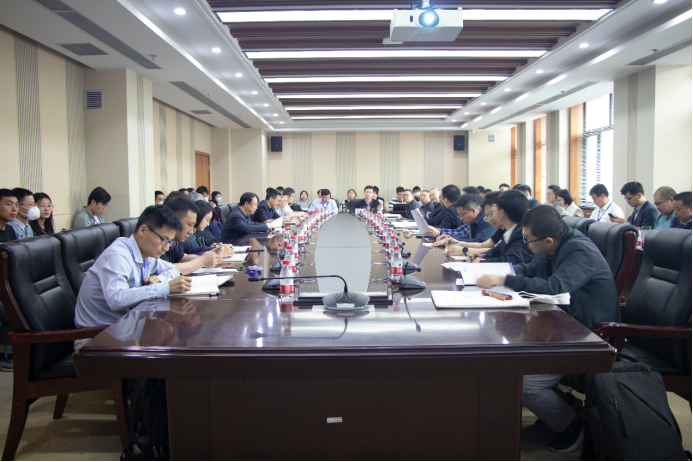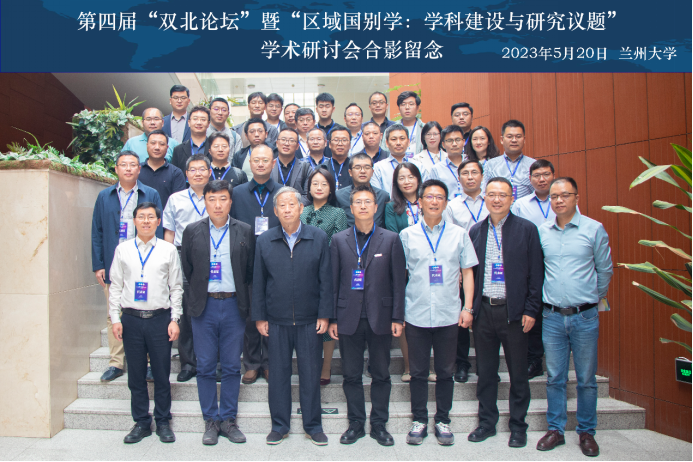In 2022, in order to meet the needs of training relevant talents and serving national strategy and development under the conditions of the new era, the Academic Degrees Committee of The State Council listed "regional and national Studies" as a first-level interdisciplinary discipline and started discipline construction. On May 20, 2023, the fourth "Dual-North Forum" and "Regional Studies: Discipline Construction and Research Topics" academic Seminar, co-sponsored by the School of Administration, Jilin University, the Institute of Central Asian Studies, Lanzhou University, and the School of Politics and International Relations, Lanzhou University, was successfully held in Lanzhou University to focus on the subject construction of regional studies.

They are from Tsinghua University, Fudan University, Renmin University of China, Shanghai Jiao Tong University, Jilin University, Sun Yat-sen University, Nankai University, Jinan University, Central China Normal University, Shaanxi Normal University, Beijing Foreign Studies University, Tianjin Foreign Studies University, University of International Business and Economics, China University of Political Science and Law, Liaoning University, Yunnan University, Northwest University of Political Science and Law, Shanghai University of Political Science and Law, Northwest University More than 40 scholars from Chinese Academy of Social Sciences, Shanghai Academy of Social Sciences, Lanzhou University and other universities and institutions gathered in Lanzhou University to discuss the discipline construction of regional and national studies and hot research topics, and exchanged views frankly. The opening ceremony of the forum was presided over by Wang Jinguo, Dean of School of Politics and International Relations of Lanzhou University. Professor Sha Yongzhong, Vice President of Lanzhou University, and Yu Haiyang, Vice Dean of School of Administration of Jilin University, delivered speeches respectively. Professor Sha Yongzhong pointed out that regional and country studies not only serve the needs of national strategy and development, but also are the forefront of the development of international relations. The "regional country studies" has become a first-level interdisciplinary discipline, marking that the discipline construction, scientific research, personnel training and social service of regional country studies will enter a new development stage, and the discipline development will usher in a major development opportunity. Lanzhou University has long attached importance to the development of regional and country studies, and has a number of research institutions with greater influence and discourse power in China, including the Institute of Central Asian Studies, the Center for Afghan Studies, the Center for Indian Studies, the Center for Georgian Studies and the Center for Italian Studies. At present, Lanzhou University's regional and national studies of the first level of interdisciplinary doctoral program is under construction. On this occasion, Lanzhou University especially expects experts from all over the country to express their opinions on topics such as discipline construction, talent training and cutting-edge research, and contribute ideas and wisdom to jointly promote regional and national studies. Professor Yu Haiyang pointed out that the "Dual-North Forum" has been committed to promoting in-depth exchanges between domestic colleagues on major issues related to national strategy and local economic and social development. The fourth Forum hopes that the participating experts can carry out more meaningful discussions under the important topics of regional and country studies and discipline construction. Professor Yang Shu, Director of the Institute of Central Asian Studies, Lanzhou University, delivered a keynote speech for the forum. With a problem-oriented approach, Professor Yang Shu proposed nine challenges in the construction of regional and national studies, such as the determination of research objects, the establishment of discipline status, the development of discipline research methods, the reference to similar disciplines and research topics, the promotion of interdisciplinary disciplines, the design of talent training programs, and so on. These challenges concern the long-term development of the discipline and research, and I hope that the experts, especially the young scholars, will contribute their wisdom to meet the challenges and solve the problems.

There were two sub-forums in the conference, and four topics were discussed respectively in the morning and afternoon, including the discipline construction and talent training of regional and country studies, the new vision of regional and country studies, and the frontier topics of regional and country studies (I and II). The first unit of the sub-forum focused on the subject construction and personnel training of regional and national studies. The first half was presided over by Professor Shu Hongshui, Dean of the School of National Security, Northwest University of Political Science and Law; Professor Li Bingzhong, Dean of the School of History and Culture, Shaanxi Normal University; Professor Lu Shanbing, Dean of the Institute of Silk Road Studies, Dean of the Institute of Central Asian Studies, Northwest University; Deputy Dean of the Institute of Regional Studies, Northwest University; Professor Yu Haiyang, School of Administration, Jilin University, and Professor Zhu Yongbiao, School of Politics and International Relations, Lanzhou University and Executive Director of the Belt and Road Research Center of Lanzhou University, spoke respectively. They conducted in-depth discussions on the construction of China's path, disciplinary advantages, research boundaries and talent training goals of regional and national studies. The second half was presided over by the Marine professor. Professor Shu Hongshui, Dean of the College of National Security, Northwest University of Political Science and Law; Professor Jiao Yiqiang, Institute of Central Asian Studies, Lanzhou University; Professor Chen Jie from the School of International Translation and Interpretation at Sun Yat-sen University and Associate Researcher Shen Xiaochen from Shanghai University of Political Science and Law and China Shanghai Cooperation Base shared their thoughts on the development experience of national security discipline, the status of domestic regional and country studies, the training of "T-shaped" talents and the training of talents involved in international organizations, respectively. The second unit of the sub-forum focuses on the new vision of regional and country studies. The first half was presided over by Professor Cui Zheng, deputy director of the China Institute of Open Economy, Liaoning University. Professor Xie Tao, Dean of School of International Studies, Beijing Foreign Studies University, Professor Sun Degang, Director of Middle East Studies Center, Fudan University, Professor Luo Shengrong, Director of the Editorial Department of Yunnan University's Institute of International Relations and Regional Studies, and Jin Xin, Associate Professor of Xi 'an Jiaotong University's Center for Asia-Europe Studies, respectively introduced their theoretical reflections on the comparative study of regional studies, Middle East studies, Chinese characteristics and the new agenda of "security-development". The second half was hosted by Professor Xie Tao. The Party Secretary and Dean of the College of National Security of Shaanxi Normal University, Prof. Zhang Yaze and Prof. Cui Zheng, Prof. Zuo Xiying of Renmin University of China and Prof. Zhao Changfeng of the College of Politics and International Relations of Central China Normal University shared their research experiences on the security dimension of regional and country studies, the construction of think tanks, and the study of the United States and Indonesia respectively. There were four discussions on the frontier topics of regional and country studies. The first session was hosted by Professor Li Qiang, Dean of the School of International Relations, Tianjin Foreign Studies University. Professor Yao Lu, School of Administration, Jilin University; Associate Professor Chen Chong, Tsinghua University; Associate Professor Chen Yi, Institute of Central Asian Studies, Lanzhou University; Associate Professor Chen Yi, School of Politics and International Relations, Lanzhou University; Dr. Liang Huaixin, Lecturer, Laboratory of Computational Social Sciences, School of International Relations, University of International Business and Economics; Dr. Li Liang, lecturer at the Institute of Central Asian Studies and the School of Politics and International Relations of Lanzhou University, discussed the regional transformation of globalization, regional factors of conflict, the relationship between UN peacekeeping operations and terrorist attacks, smart technology and regional country studies, and India's "two-sided alliance" strategy. The second session was moderated by Professor Zhang Yatze. Associate Professor Wei Yingjie, Vice Dean, School of International and Public Affairs, Shanghai Jiao Tong University; Associate Professor Zhao Siyang, School of International Relations, Jinan University; Associate Professor Gu Wei, Executive Director, Eurasia Division, Institute of International Studies, Shanghai Academy of Social Sciences; Associate Professor Li Yibin, Institute of Central Asian Studies, Lanzhou University, School of Politics and International Relations, Lanzhou University. Liu Qian, a lecturer at the Institute of Central Asian Studies and the School of Politics and International Relations at Lanzhou University, discusses refugees in conflict, China's concept of the "region," the restructuring of Eurasia, the security risks of the China-Pakistan Economic Corridor, and India's media narrative on the "Indo-Pacific Strategy." The third session was hosted by Professor Zhu Yongbiao, Executive Director of the School of Politics and International Relations of Lanzhou University and the Belt and Road Research Center of Lanzhou University. Professor Li Qiang, Dean of School of International Relations, Tianjin Foreign Studies University; Professor Chen Xiaoding, Vice Dean of School of Politics and International Relations, Lanzhou University; Professor Qi Kai, Associate Professor of Institute of Globalization and Global Issues, China University of Political Science and Law; Associate Professor Zhang Falin, Director of Zhou Enlai School of Government and Center for Silk Road Studies, Nankai University; Dr. Li Chengri, Assistant researcher at the Institute of Asia-Pacific and Global Strategy, Chinese Academy of Social Sciences, discussed global climate governance, SCO development, Sino-foreign cooperation in science, technology and economic and trade, the political economy of regional and country studies, and Japan's Northeast Asia studies. The fourth session was presided over by Vice President Wei Yingjie. Professor Sun Xingjie, School of International Studies, Sun Yat-sen University, Dr. Ma Bin, Associate Research Fellow, School of International Studies, Fudan University, Associate Professor Wei Jinshen, Institute of Central Asian Studies, Lanzhou University, School of Politics and International Relations, Lanzhou University, Dr. Sang Pu, lecturer at the School of Politics and International Relations of Lanzhou University, discussed Northeast Asian studies, post-imperial space, Central Asian integration, Central Asian Studies, and U.S. cybersecurity strategy. At the closing ceremony of the Forum, Professor Chen Xiaoding, Vice Dean of the School of Politics and International Relations of Lanzhou University, and Professor Yu Haiyang, School of Administration of Jilin University, respectively made a summary discussion of the forum and expressed gratitude to all the guests for their presence and support. The School of Administration of Jilin University, the Institute of Central Asian Studies of Lanzhou University and the School of Politics and International Studies of Lanzhou University all have academic traditions of studying regional and national issues. The first "Double-North Forum" will be held in 2020, aiming to build an academic platform for teachers and students of the two universities and more universities and research institutions to discuss related academic issues. The second and third sessions in 2021 and 2022 will be held by Lanzhou University and Jilin University respectively. The successful holding of the fourth "Dual-North Forum" in 2023 provided a rare opportunity for many experts and scholars to carry out in-depth academic exchanges and debates on major theoretical issues and a series of research topics in the construction of regional and national studies. The meeting reached the necessary consensus, which will help to provide necessary assistance for the construction of regional and national studies.
